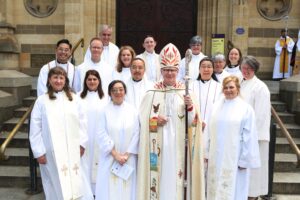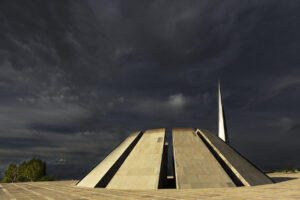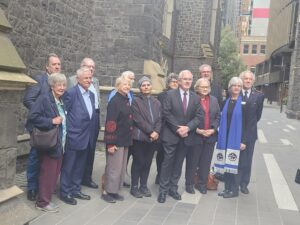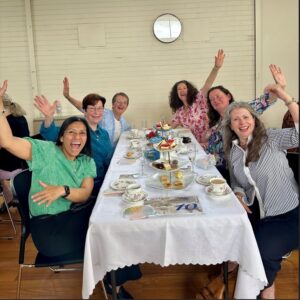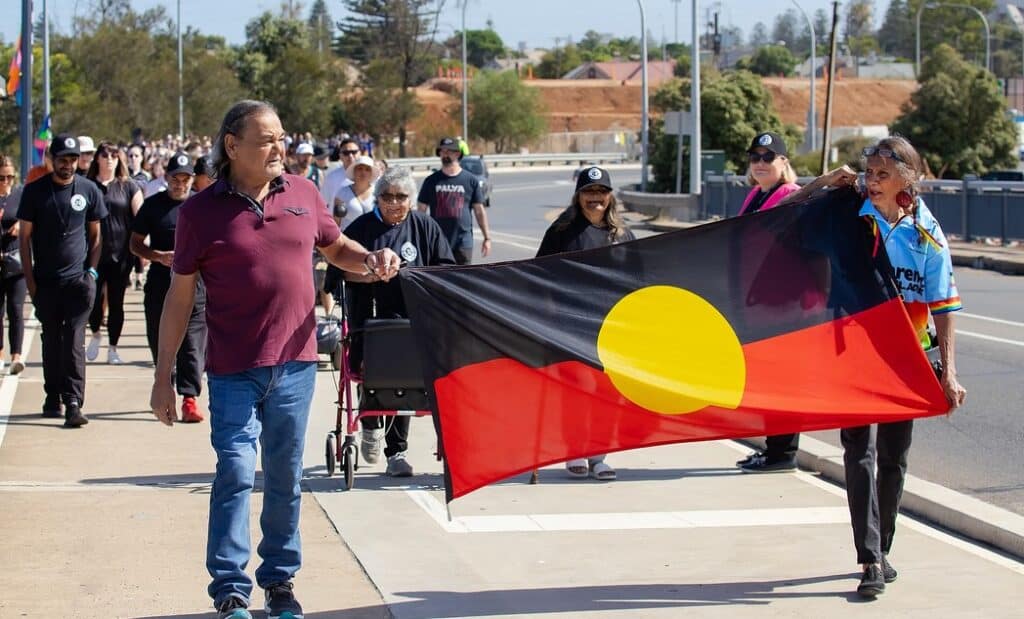
Jenan Taylor
25 January 2023
Equality and justice for Indigenous people should be the focus of conversations around Australia Day because they were still excluded in Australia, an Anglican leader said.
Many Aboriginal and Torres Strait Islanders see it as a day to grieve, while other Australians prepare to celebrate on the public holiday.
Aboriginal leaders say they want the Church to support them to have Australia Day abolished.
It comes amid on-going, often divisive debate about the suitability of 26 January for a national day.
Wiradjuri man the Reverend Canon Glenn Loughrey wants discussions about Australia Day to centre on how to bring about justice for Indigenous people, rather than the date.
Canon Loughrey said it didn’t matter what day was set aside for Australia Day as it would be problematic.
“For First Nations people who have not been included in the significant moments of this country and have no treaty or voice and have never ceded sovereignty over our lands, no day that celebrates Australia will include us,” Canon Loughrey said.
Read more: Where to now? Indigenous leaders ask churches to reflect on Aboriginal Sunday
He said January 26 was particularly controversial because it was the day that identified a particular point in history that was very tough for Aboriginal and Torres Strait Islander people.
Canon Loughrey said October 14 might have been a suitable day if Australians had voted “Yes” in the referendum for an Indigenous Voice, but they chose otherwise.
It was particularly difficult to discuss Indigenous views of 26 January this year given that setback, he said.
Canon Loughrey said the referendum polarised people’s positions on Indigenous justice and gave many permission to take extreme stances about 26 January.
He said he didn’t do anything on that day and usually sat in the Wominjeka garden at his church St Oswald’s Glen Iris, because it was such a painful time.
trawloolway man, the Reverend Canon Dr Garry Deverell said he wanted the most visible church leaders to say something in public about how problematic the day was for Aboriginal people.
He said that would help create a safer environment for them and others who struggled with the concept of Australia Day to say how they felt about it.
Read more: Indigenous Christian leaders ‘gutted’, but unwavering after Voice setback
Dr Deverell said he and other National Aboriginal and Torres Strait Islander Anglican Council leaders had invited the Liturgy Commission in 2020 to consider revising the Australian Lectionary reading options for Australia Day.
The aim was to make them less confronting for Aboriginal people by replacing them with Biblical texts of lament and hope, he said.
He said Aboriginal Christian leaders just wanted the Church to support them in their call for Australia Day to be abolished on 26 January.
“[Indigenous Christians] have been protesting about January 26, on January 26, as Invasion Day, since at least 1938,” Dr Deverell said.
“It would be lovely if the Church got on board with this, but at the moment the prevailing culture is one of silence, which doesn’t help us.”
He said many Indigenous people didn’t attend church on the Sundays either side of 26 January to avoid the nationalistic sentiment that was usually around.
Read more: The church, like society, has become more unsafe for our people
The Reverend David Fuller said he encouraged members of his God Squad motorcycle ministry to stand in solidarity with Indigenous people on 26 January.
Mr Fuller said they marked it as day of mourning and never did a run or ride on that day for that reason.
As senior minister of St Mark’s Spotswood, he said he was also conducting a sermon on psalms of lament and mourning for the Sunday after 26 January.
Mr Fuller said it would draw parallels between the loss experienced by the Aboriginal people and their day of communal lament and non-Indigenous days of lament.
These included Anzac Day and Good Friday, a day of communal lament for the Christian community, Mr Fuller said.
Read more: Respect First People’s mental suffering, whatever Voice outcome: Christian leaders
South Croydon Anglican senior minister the Reverend Bruce Bickerdike said his church was committed to developing good awareness about what Indigenous people experienced.
He said the aim was to help non-Indigenous worshippers understand more about Aboriginal culture and their communities.
For many years the services had regularly featured talks by Indigenous people about what mattered to them, Mr Bickerdike said.
These included presentations by young Indigenous people involved in treaty negotiations in Victoria about why treaty was so important, and how to discuss it.
For more faith news, follow The Melbourne Anglican on Facebook, Instagram, or subscribe to our weekly emails.

